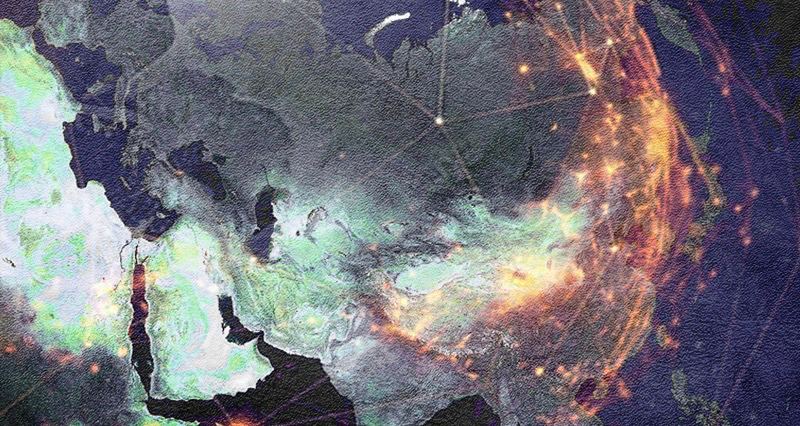In the broadcast “The New World” on Turkish TV Ulusal Kanal, experts, journalists and politicians gathered to discuss the rising tensions and conflict zones around the world. The guests exchanged views on the major developments in the world from Ukraine to the Olympics and from Palestine to Africa.
With the moderation of Kıvanç Özdal, the Head of Foreign News of Ulusal Kanal, the guests were Jacques Cheminade, President of the French Solidarity and Progress (Solidarité et Progrès), Brazilian journalist Pepe Escobar, Iranian researcher and writer Masoud Sadr, Retired Turkish Brigadier General Prof. Dr. Fahri Erenel from Istinye University in Istanbul and Aydınlık newspaper columnist Ali Rıza Taşdelen.
“Artificial money in the Atlantic, production in Eurasia”
In the program, the guests agreed that a new multipolar world is emerging and highlighted the importance of Türkiye, Russia and China as leading countries in this regard.
French politician Jacques Cheminade emphasized the economic aspect
“While the Atlantic prints ‘artificial money’, the real agricultural and industrial production is in the BRICS countries. As peoples of the West and the US, we must protect ourselves against the moves of the US financial oligarchy and NATO. There are great changes and developments in Russia and China, and we need to understand that to secure our future in Europe.”
Politicization of the Olympic Games by globalists
During the program, held on the opening day of the Olympic Games, the opening ceremony and the administration of the Games were also discussed. While other guests pointed to the “politicization of the Olympics by globalists” and the “exclusion of Russia”, Retired Turkish Brigadier General Prof. Fahri Erenel said that “a political wall built against Russia in the Olympics” mentioning also the Ukraine Peace Summit in Geneva on 15-16 June:
“The Olympics Games has been politicized. A year ago, we held a symposium on how the Olympics have become politicized. We examined the implementations against China and Russia. Now in the Olympics, which is expected to promote peace and fraternity, we see that Russian athletes are banned, and some penalties are being imposed on some countries. This political wall is a major obstacle to world peace. The Paris Olympics actually strengthens fault lines rather than promoting fraternity. Russia was not invited to the Peace Summit in Geneva. Is peace possible without talks with Russia?”
“Macron blindly follows the US’s policies”
On the Ukraine issue, the guests mostly emphasized the damage caused by US strategy to European countries.
Jacques Cheminade criticized Macron for “blindly following American plans” and “being controlled from outside”.
Ali Rıza Taşdelen said while Macron has been pursuing a policy to stand his country out in the European Union, France turned out to be the hardest hit by the sanctions on Russia.
Taşdelen, who lived and studied in France for many years, added: “France was already in a major economic crisis. It did not start with the war in Ukraine. Three years before the war, the Yellow Vests movement took place because neoliberal globalization had failed in Europe. With Russia’s operation in Ukraine, the cutoff of Russian gas deepened the crisis much more. France has undergone unprecedented price hikes and high inflation. The French people are well aware that this is due to hostile policies against Russia. Let’s consider the farmers. Agricultural trade between France and Russia was at a high level. When this trade was cut off, farmers rose up. Farmers were also victims of unfair competition of wheat imported from Ukraine.”
“Psychological warfare” against Iran
The guests also discussed some important developments in West Asia.
Iranian researcher and writer Masoud Sadr pointed out the “psychological warfare” against Iran:
“A psychological warfare has already begun against the new president’s government. The West and the US are trying to blame Iran for all the bad things that happen in their countries and looking for Iran’s hand in. The accusations after the Trump assassination attempt are an example of this.”
The guests also referred to “Türkiye-Russia-Iran cooperation” as a “necessity” for West Asia.
“China strives for peace in Gaza, the US applauds genocide”
On the topic of the Israel-Palestine war, Jacques Cheminade commented on Israeli Prime Minister Benjamin Netanyahu being applauded in the US Congress. Cheminade stated that behind Netanyahu are not American Jews but the American state and secret intelligence.
Pepe Escobar noted the contrast between “China’s efforts for peace in Gaza” and the “US’s applause for genocide”:
“The Beijing Declaration announced in Beijing is very important. The Chinese succeeded in bringing together 14 groups in Palestine to sign a declaration including forming a National Unity Government. Meanwhile, a genocide perpetrator was applauded 58 times in the US Congress. The difference is clear.”
Africa as a wing of the rising Eurasia
Another topic of the program was the “awakening of Africa”. Evaluating the developments in the Sahel region, Ali Rıza Taşdelen said that “the region is under the threat of Western-backed terrorism”, but “the Atlantic forces were defeated in Africa” while “the Eurasian front led by Russia, China and Türkiye is gaining strength”. According to the Turkish journalist, Africa is also “breathing the Asian age”. Taşdelen described the confederation of Sahel countries as a “historic and giant step” and said that “the people in these countries carrying Russian and Turkish flags was not in vain”.
According to Taşdelen, with this new character, “Africa has formed a wing of the rising Eurasia”. He added that African countries are heading towards economic independence through BRICS and developing joint currency projects. In this regard, he noted the importance of Turkish Foreign Minister Hakan Fidan’s visit to Nige

















Leave a Reply